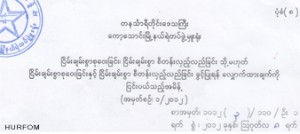Authorities reject large-scale protest of Kaw Taung District power plant
August 14, 2012
HURFOM: On August 7, 2012, U Than Htun, the regional organizer of the Democratic Party (Myanmar), and other local residents of Kaw Taung District were denied their application to the Tenasserim Region Government Chief Minister to permit 100,000 people to protest the nearby Than Phyo Thu coal-fired power plant. U Than Htun’s group applied to have 30 government security personnel safeguard the protestors, but the request was refused because township authorities perceived the number to be too low for such a large protest, and asserted that the march would interrupt the area’s regular activities.
 The contested coal-fired power plant is located between the Shew Pyi Tar and Aye Yaik Nyein quarters of Kaw Taung District. Built by the Than Phyo Thu Coal Excavation Company and owned by Thai-Burmese businessman U Kyaw Lwin, the plant has yet to be granted the 30-year guarantee requested to begin producing energy. Although the plant was originally built in Thailand in 2000, the backlash from local Thai residents caused the project to be moved and reconstructed in Kaw Taung in August 2011. When the plant was transferred, Kaw Taung villagers learned that the power it produced would drop local electricity costs from 600 kyat per unit to 200 kyat per unit, but were not told about the possibility of adverse consequences to the densely populated area.
The contested coal-fired power plant is located between the Shew Pyi Tar and Aye Yaik Nyein quarters of Kaw Taung District. Built by the Than Phyo Thu Coal Excavation Company and owned by Thai-Burmese businessman U Kyaw Lwin, the plant has yet to be granted the 30-year guarantee requested to begin producing energy. Although the plant was originally built in Thailand in 2000, the backlash from local Thai residents caused the project to be moved and reconstructed in Kaw Taung in August 2011. When the plant was transferred, Kaw Taung villagers learned that the power it produced would drop local electricity costs from 600 kyat per unit to 200 kyat per unit, but were not told about the possibility of adverse consequences to the densely populated area.
Now, villagers are uniting to express their fears about potential increases to pollution and health risks affecting local people, animals, ocean life, and groundwater should the plant be allowed to operate. U Than Htun conveyed his concern that rises in miscarriages, heart disease, and skin cancer may occur from drinking contaminated water or breathing harmful particulates in the air. Some residents point to the suffering endured by villagers in southern Shan State due to the Ti-Jite coal-fired plant as evidence that associated hazards may outweigh the benefits.
One local villager said, “Because the plant is so close to where we live, we have been faced with serious situations like noise and air pollution. All of us living in this quarter want to request [the company] to stop running their plant. If they continue, we cannot live here, and that would threaten our means to livelihood.”
Despite the government recently lifting its ban on public demonstrations, the current conditions for holding protests still present significant obstacles to civil freedom. According to Article 354 of the 2008 Myanmar Constitution, citizens are permitted, “to express and publish freely their convictions and opinions” and “to assemble peacefully without arms,” but only, “if not contrary to the laws, enacted for Union security, prevalence of law and order, community peace and tranquility or public order and morality.”
In addition to constitutional limitations, the Law Relating to Peaceful Assembly and Peaceful Procession signed by President Thein Sein in December 2011 requires that demonstrators obtain permission from township authorities at least five days in advance of the protest by providing detailed information about the event’s participants and purpose.
Leaders organizing the Kaw Taung march reported that the protest application form requested their names, signatures, addresses, dates of birth, ethnicity, religion, ID card number, education, marital status, job, and organizational affiliation. Applicants were also asked to include information about the protest’s planned slogans, activities, and other advocacy materials.
Previously, U Than Htun’s group enjoyed a victory resulting from their demonstration against the construction of a deep-sea port in Tavoy district, which the government subsequently halted. Now, members are uniting again to oppose the power plant, and are currently speaking out against the machinery testing that is planned to begin at the site this week.
U Than Tun said, “We want to stop them from operating the coal-fired plant, but they say they will stop [if and when] the public is affected. How can we accept that the villagers must suffer first before they will stop? Although the power produced at the plant is cheaper, some villagers who are aware [of the side effects] do not want to use the power because they understand the impact.”
On March 16, 2012, a large number of villagers joined a plant protest after U Than Tun’s group distributed around 10,000 pamphlets describing the effects of the power plant on people of Kaw Taung district. The following month, demonstrators sent a letter of opposition to President Thein Sein with signatures from 70 residents. As of yet, the group has not received a response.
According to U Than Tun, Shew Pyi Tar and Aye Yaik Nyein quarters will be the most impacted by the plant, but nearby Shew Zin Yaw, Shew Hin Tar, An Na War, Ba Yin Naung, Pa Dauk She War, Aung Tu Kha, Aye Mya Kan and TiRi Myine quarters are also likely to be affected.
Comments
Got something to say?
You must be logged in to post a comment.



















































